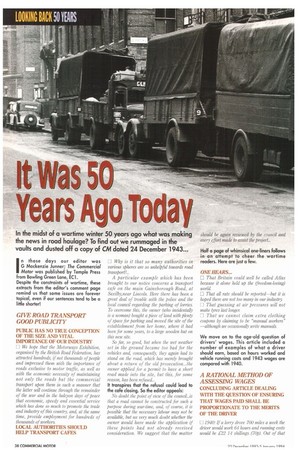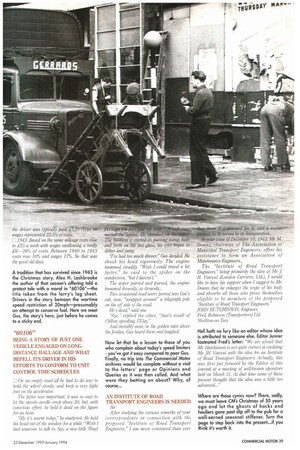II as Years Ago Toda
Page 40

Page 41

If you've noticed an error in this article please click here to report it so we can fix it.
In those days our editor was G Mackenzie Junner; The Commercial Motor was published by Temple Press from Bowling Green Lane, EC1.
Despite the constraints of wartime, these extracts from the editor's comment page remind us that some issues are forever topical, even if our sentences tend to be a little shorter!
PUBLIC HAS NO TRUE CONCEPTION OF THE SIZE AND VITAL IMPORTANCE OF OUR INDUSTRY rl We hope that the Motorways Exhibition, organised by the British Road Federation, has attracted hundreds, if not thousands of people and impressed them with the importance of roads exclusive to motor traffic, as well as with the economic necessity of maintaining not only the roads but the commercial transport upon them in such a manner that the latter will continue through the remainder of the war and in the halcyon days of peace that economic, speedy and essential service which has done so much to promote the trade and industry of this country, and, at the same time, Provide employment for hundreds of thousands of workers LOCAL AUTHORITIES SHOULD HELP TRANSPORT CAFES Li Why is it that so many authorities in various spheres are so unhelpful towards road transport?.,.
A particular example which has been brought to our notice concerns a transport cafe on the main Gainsborough Road, at Saxilby, near Lincoln. Here there has been a great deal of trouble with the police and the local council regarding the parking of lorries. To overcome this, the owner (who incidentally is a woman) bought a piece of land with plenty of space for parking and moved the site of the establishment from her home, where it had been for some years, to a large wooden hut on this new site.
So far, so good, but when the wet weather set in the ground became too bad for the vehicles and, consequently, they again had to stand on the road, which has merely brought about a return of the old prosecution... the owner applied for a permit to have a short road made into the site, but this, for some reason, has been refused...
It transpires that the refusal could lead to the cafe closing. So the editor appeals:
No doubt the point of view of the council...is that a road cannot be constructed for such a purpose during war-time, and, of course, it is possible that the necessary labour may not be available, hut we very much doubt whether the owner would have made the application if these points had not already received consideration. We suggest that the matter
Half a page of whimsical one-liners follows in an attempt to cheer the wartime readers. Here are just a few.
1=1 That Britain could well be called Atlas because it alone held up the (freedom-loving) world I=1 That all rats should be reported—but it is hoped there are not too many in our industry El That guessing at air pressures will not make lyres last longer 11 That we cannot claim extra clothing coupons by claiming to be "manual workers" —although we occasionally write manuals.
We move on to the age-old question of drivers' wages. This article included a number of examples of what a driver should earn, based on hours worked and vehicle running costs and 1943 wages are compared with 1940. A tradition that has survived since 1943 is the Christmas story. Alex H. Lashbrooke the author of that season's offering told a protest tale with a moral in "60106"—the title taken from the lorry's log sheet. Drivers in the story bemoan the wartime speed restriction of 20mph—presumably an attempt to conserve fuel. Here we meet Gus, the story's hero, just before he comes to a sticky end.
E On an empty road all he had to do was to hold the wheel steady, and keep a very light foot on the accelerator The latter was important; it was so easy to let the speedo needle creep above 20, but, with conscious effort, he held it dead on the figure for an hour "My it's warm today," he muttered He held his head out of the window for a while "Wish! had someone to talk la Say, a nice little Waaf Perhiip'Filjn misled the screen. lie switched 64';' The maiitent it started its purring swing, be and forth on the wet glass, his eves began to dither and jump.
"I've had too much dinner," Gus decided. He shook his head vigorously. The engine hummed steadily. "Wish I could travel a bit faster," he said to the spider on the windscreen, "but I daresn't."
The wiper purred and purred, the engine hummed drowsily..so drowsily..
Two occasional road users peered into Gus 's cab, now, "wrapped around" a telegraph pole on the off side of the road.
He's dead," said one "Aye," replied the other, "that's result of rftllow speeding, I'll lay" And invisibly near, in the golden mist above the Jordan. Gus heard them and laughed TRANSPORT ENGINEERS IS NEEDED Sir.
After studying the various remarks of your correspondents in connection with the proposed "Institute of Road Transport Engineers," I am more convinced than ever r issue of De&mber 10, 1943, Mr M Downs, chairman of The Association of Municipal Transport Engineers, offers his assistance to form an Association of Maintenance Engineers..
The "Institute of Road Transport Engineers," being primarily the idea of Mr f. H. Vincent (London Carriers, Ltd.), I would like to have his support when I suggest to Mr Downs that he enlarges the scope of his body and absorbs all those who prove themselves eligible to be members of the proposed "Institute of Road Transport Engineers" JOHIV HUTCHINSON Engineer, Fred. Robinson (Transporters) Ltd. Stockton-on-Tees Hell hath no fury like an editor whose idea is attributed to someone else. Editor Junner footnoted Fred's letter: "We are afraid that Mr Hutchinson is not quite correct in crediting Mr III Vincent with the idea for an Institute of Road Transport Engineers. Actually, this was first put forward by the Editor of this journal at a meeting of well-known operators held on March 31. At that time some of those present thought that the idea was a little too advanced..."
































































































































